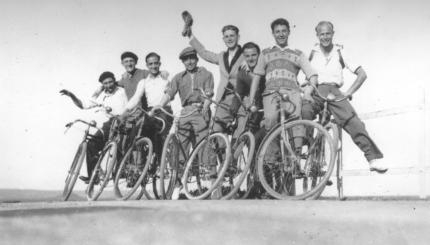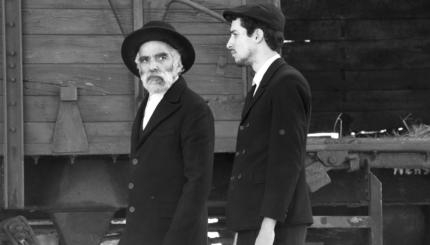Improv Debuts“I can’t remember a single coherent sentence Paul Sills said. But as it often happens with talented directors… somehow he got his message across.” –Alan Arkin
“I can’t remember a single coherent sentence Paul Sills said. But as it often happens with talented directors… somehow he got his message across.” –Alan Arkin
In the late ’50s, after helping to create television sketch comedy, the modern humor magazine, and the stand-up routine, Jewish writers invented yet another comedic institution: contemporary improv theater. Founded in 1959 and named for an article about Chicago in The New Yorker by A. J. Liebling, Second City attracted the University of Chicago’s best and brightest. Second City would, over the next decade, launch the careers of numerous Jewish celebrities, including Mike Nichols, Elaine May, Alan Arkin, Joan Rivers, Robert Klein, George Segal, Ed Asner, and David Steinberg.
In 1963, continuing in the politically aware, satirical tradition of The Realist and Second City, The Committee emerged in San Francisco as the comedy troupe for the hippie counterculture. Appearing frequently on The Smothers Brothers Comedy Hour and in its own self-titled concert film, both in 1968, The Committee included such future Jewish comedic lights as Rob Reiner, Gary Goodrow (a Beat poet and future co-author of the first two Honey I Shrunk The Kids movies), and Carl Gottlieb (screenwriter of Jaws and The Jerk, among other films).
Fumbling & Filmmaking
“I’m nine, going on 69!” –Jerry Lewis
While Jewish comedians were breaking new ground in the world of improvisation, Jerry Lewis was staking out a middle ground between crowd-pleasing clown and social commentator. Film historian Leonard Maltin notes in his book The Great Movie Comedians that Lewis almost single-handedly carried the banner of film comedy throughout the ’60s, as most of his colleagues migrated to television.
As writer, producer, and director of his own movies, Lewis wanted to make a statement about the plight of the “little guy.” While his comedy had nowhere near the sting of Lenny Bruce, it was more critical of society than the antics of Sid Caesar.

Help us keep Jewish knowledge accessible to millions of people around the world.
Your donation to My Jewish Learning fuels endless journeys of Jewish discovery. With your help, My Jewish Learning can continue to provide nonstop opportunities for learning, connection and growth.
Jerry Lewis’s role as socially conscious comedian is perhaps delivered most poignantly in his directorial debut, The Bellboy (1960). Lewis’s character, Stanley, a lovable loser in the tradition of Charlie Chaplin, is an absurdly overworked bellhop at a luxury hotel. However, there is something different about this “loser.” With his frizzy, unkempt hair and pervasive sense of melancholy, he elicits a strong hint of the ethnic “other.”
Lewis paints Stanley in broad slapstick strokes, but, in the final scene, the audience discovers another dimension of the bellboy. The hotel’s owner, Mr. Novak, has been yelling at Stanley, who has not said a word throughout the entire picture. Taking Stanley’s silence as a sign of insolence, Novak screams: “What’s the matter with you? Can’t you talk?”
Stanley ponders this question for a moment, leaving the audience spellbound: WILL HE TALK? He does, and is well-spoken: “Well, certainly I can talk. I suspect that I can talk as well as any other man, Mr. Novak.” Calmed by his employee’s respectful tone, Novak asks, “Well, in that case, how is it we never heard you talk before?” Stanley thinks a moment, and then it dawns on him: “Because no one ever asked me!” And with that, he resumes whistling his trademark tune and putters onto his next menial task, leaving the audience to ponder the subtext: “Because no one ever asked a lower-class Jew like me.”
Are Ernie and Bert Jewish?
“I’ll sing you a tale of Wernher Von Braun,
A man whose allegiance is ruled by expedience,
Once the rockets are up, who cares where they come down,
‘That’s not my department,’ says Wernher Von Braun.”
—Tom Lehrer, “Wernher Von Braun”
The political culture of the late 1960s found its way into children’s programming with the creation of Sesame Street, a show that reflected progressive themes such as ecology and multiculturalism. The show’s Jewish writers included musical satirist Tom Lehrer, former Caesar’s Hour scribe Gary Belkin, and future National Lampoon writer (and son of humorist Bennett Cerf) Christopher Cerf.
And, as Waldoks and William Novak relate in The Big Book of Jewish Humor, some of the show’s Ernie and Bert sketches were reworkings of traditional Jewish jokes, such as the following:
Reb Isaac and Reb Jacob were fundraisers for competing yeshivas. Finding themselves having tea together at the home of a wealthy benefactor, they soon became involved in an intricate discussion of talmudic law, and were interrupted only by the arrival of the hostess, who brought their tea. A moment later she returned with a platter containing two cookies. Both cookies were substantial, but one was considerably larger than the other.
Observing the rules of etiquette, both men continued talking, and did their best to ignore the cookies. But before long Reb Isaac reached over and grabbed the larger cookie, devouring it in three swift bites.
Reb Jacob looked on in astonishment. “I can’t understand this,” he said. “How can a great scholar like you be so ignorant of table manners?”
Reb Isaac looked surprised. “Wait a minute,” he said. “What would you have done in my place?”
“What any gentleman would have done,” replied Reb Jacob. “I would have taken the smaller cookie.”
“So what are you getting excited about?” replied Reb Isaac with a grin. “Isn’t that what you got?”
The End of an Era
“If only God would give me a clear sign! Like making a large deposit in my name at a Swiss bank.” –Woody Allen
At the end of the 1960s, a startling transformation occurred in the comedy world. One of the new comics of the nightclub circuit became a movie star without having to submit to the “de-Jewification” of his Borscht Belt predecessors. In Woody Allen’s directorial debut, Take The Money And Run (1969), a faux “documentary” about inept bank robber Virgil Starkwell, audiences finally saw a Jewish film protagonist who shed the vaudeville “tummler” (clown) persona of a Danny Kaye or Jerry Lewis, while remaining the outcast.
Allen’s character embraced the neurotic, analytic, intellectual model carved out by his peers in the stand-up and short-form improv world (such as the team of Nichols and May, and Lenny Bruce) and melded it into a believable, sustainable Jewish screen persona that was both contemporary and old-world. In the words of Paul Peter Porges, his “verbally nimble nebbish” character is “built on a kind of talmudic wisdom that argues points.”
By the end of the ’60s, the presence of Jews in comedy had evolved from the road-trip vaudevillian acts of yesteryear to the open world of the late 1940s and 1950s to the forefront of radical, turbulent social change. Jewish perspectives on life would have a profound effect on the American psyche, even as America continued to be, ironically, a breeding ground for anti-Semitism — a point well illustrated in this traditional Jewish joke of the period:
During World War II, one day, a sergeant at an army base in the Deep South gets a call from a woman. She says, “Sergeant, for Thanksgiving, we’d like to entertain five soldiers at our house.”
He says, “Fine, we’ll send them over, and thank you for your hospitality.” And she says at the end, “And Sergeant, just please don’t send any Jews.” He says, “I understand, ma’am.”
Thanksgiving day comes, there’s a knock on her door, and the woman opens up the door–this is the Deep South–to her utter shock, there are five black soldiers there.
And she says, “What are you doing here?” And they say, “We understand that you invited us for Thanksgiving.” She says, “What are you talking about? This is a terrible mistake.”
And one of the soldiers says, “No, Sergeant Goldberg never makes a mistake.” (Rabbi Joseph Telushkin, Jewish Humor: What the Best Jewish Jokes Say About the Jews)
“In the past, when we felt politically powerless, humor was a tool,” explains Rabbi Telushkin. But by the late ’60s, the Jews’ status in comedy changed. As Paul Peter Porges says: “We created a very unique American Jewish humor style, which now, in our day and age, is no longer Jewish humor, it’s American humor!”
Adapted with permission from Reform Judaism magazine.



